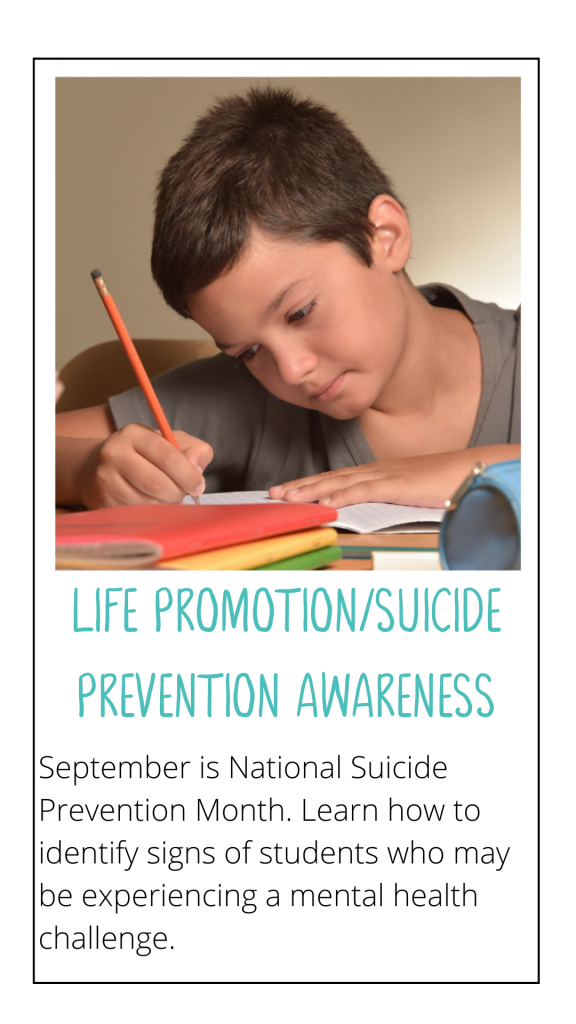Effective Strategies For Mental Health Literacy Education

Table of Contents
Developing Comprehensive Curricula for Mental Health Literacy
Creating effective Mental Health Literacy Education programs requires carefully designed curricula that cater to diverse audiences and incorporate evidence-based practices.
Age-Appropriate Curriculum Design
Tailoring education to different age groups is essential for effective learning.
- Children (5-12 years): Use interactive games, storytelling, and age-appropriate visuals to introduce basic concepts of emotions and mental wellbeing. Focus on building resilience and coping skills.
- Adolescents (13-18 years): Implement peer support programs, group discussions, and interactive workshops addressing common adolescent mental health challenges like anxiety, depression, and stress. Introduce mindfulness techniques and healthy coping mechanisms.
- Adults (18+ years): Offer workshops, seminars, and online courses covering a wider range of mental health topics, including stress management, relationship building, and understanding different mental health conditions. Focus on practical skills and self-help strategies.
Incorporating diverse perspectives and lived experiences within the curriculum is crucial for inclusivity and relevance.
Incorporating Evidence-Based Practices
Utilizing research-backed strategies ensures maximum impact and effectiveness in Mental Health Literacy Education.
- Cognitive Behavioral Therapy (CBT) principles: Teach individuals how to identify and challenge negative thought patterns and behaviors.
- Mindfulness techniques: Promote stress reduction and emotional regulation through mindfulness exercises and meditation.
- Solution-focused brief therapy: Focus on identifying strengths and resources to build coping mechanisms and achieve goals.
Continuous evaluation and adjustment of curricula based on feedback and outcomes are vital for ongoing improvement.
Addressing Stigma and Promoting Help-Seeking Behavior
Reducing the stigma surrounding mental illness is paramount for effective Mental Health Literacy Education.
- Sharing personal stories: Encourage open and honest conversations by sharing recovery stories from individuals with lived experience.
- Highlighting success stories: Showcase positive outcomes of seeking help and engaging in treatment.
- Destigmatization campaigns: Utilize media and community campaigns to challenge negative stereotypes and promote understanding.
These strategies help foster a supportive environment where seeking help is viewed as a sign of strength, not weakness.
Utilizing Diverse Educational Methods for Mental Health Literacy
Employing a variety of engaging methods maximizes reach and impact in Mental Health Literacy Education.
Interactive Workshops and Training Sessions
Moving beyond traditional lectures, interactive sessions foster deeper learning and engagement.
- Role-playing: Simulate real-life scenarios to practice communication and coping skills.
- Group discussions: Facilitate peer learning and sharing of experiences.
- Case studies: Explore real-world examples to enhance understanding of mental health conditions.
Hands-on activities and practical skills training empower individuals to apply their newfound knowledge in everyday life.
Online Resources and Digital Platforms
Leveraging technology expands accessibility and reach for Mental Health Literacy Education.
- Websites: Create user-friendly websites with comprehensive information, resources, and self-assessment tools.
- Apps: Develop mobile apps offering mindfulness exercises, mood trackers, and access to mental health support.
- Online courses and webinars: Deliver engaging and flexible learning experiences.
User-friendly design and accessibility features are essential for inclusivity.
Community-Based Education Initiatives
Reaching underserved populations requires community partnerships and culturally sensitive approaches.
- Schools: Integrate mental health education into school curricula.
- Community centers: Partner with local organizations to offer workshops and support groups.
- Faith-based organizations: Leverage existing community networks to promote mental health awareness and support.
Addressing health disparities and providing culturally appropriate education are critical aspects of effective community engagement.
Evaluating the Effectiveness of Mental Health Literacy Education Programs
Measuring the impact of Mental Health Literacy Education programs is essential for continuous improvement.
Measuring Knowledge and Attitudes
Assessing changes in participants’ understanding and beliefs is crucial.
- Pre- and post-tests: Measure knowledge gain through assessments before and after the program.
- Questionnaires: Gather data on attitudes, beliefs, and perceived stigma related to mental health.
- Focus groups and interviews: Collect qualitative data to understand changes in perspectives and experiences.
A comprehensive approach combines quantitative and qualitative methods for a complete understanding.
Tracking Help-Seeking Behaviors
Monitoring whether education programs lead to increased help-seeking is a key indicator of success.
- Surveys: Assess participants’ help-seeking intentions and behaviors after the program.
- Follow-up interviews: Gather detailed information on participants' experiences seeking help.
Long-term impact measurement can be challenging, requiring longitudinal studies and follow-up assessments.
Utilizing Feedback for Program Improvement
Continuous refinement based on evaluation results is crucial for optimizing programs.
- Surveys and feedback forms: Gather data on program strengths, weaknesses, and areas for improvement.
- Focus groups: Facilitate open discussions to gain insights and understand participants' perspectives.
Iterative program development ensures that Mental Health Literacy Education remains relevant, effective, and impactful.
Empowering Individuals Through Effective Mental Health Literacy Education
Effective Mental Health Literacy Education relies on comprehensive curricula tailored to diverse audiences, diverse educational methods that maximize reach and engagement, and rigorous program evaluation to ensure ongoing improvement. By reducing stigma, promoting help-seeking behavior, and fostering a supportive community environment, we can empower individuals to prioritize their mental wellbeing. Invest in effective mental health literacy education today. Let’s work together to build a more informed and supportive community where everyone feels empowered to prioritize their mental wellbeing.

Featured Posts
-
 Top Agent Incentive Ponant Offers 1 500 Flight Credit For Paul Gauguin Sales
May 02, 2025
Top Agent Incentive Ponant Offers 1 500 Flight Credit For Paul Gauguin Sales
May 02, 2025 -
 Paul Gauguin Cruise Sales Incentive 1 500 Flight Credit From Ponant
May 02, 2025
Paul Gauguin Cruise Sales Incentive 1 500 Flight Credit From Ponant
May 02, 2025 -
 Analysis Duponts Impact On Frances Rugby Win Against Italy
May 02, 2025
Analysis Duponts Impact On Frances Rugby Win Against Italy
May 02, 2025 -
 Check Daily Lotto Results For Friday April 18 2025
May 02, 2025
Check Daily Lotto Results For Friday April 18 2025
May 02, 2025 -
 Blue Origin Rocket Launch Cancelled Subsystem Issue Delays Mission
May 02, 2025
Blue Origin Rocket Launch Cancelled Subsystem Issue Delays Mission
May 02, 2025
Latest Posts
-
 Tensions Rise Tory Chairmans Clash With Reform Uk Over Populism
May 03, 2025
Tensions Rise Tory Chairmans Clash With Reform Uk Over Populism
May 03, 2025 -
 Tory Chairman And Reform Uk A Growing Rift Despite Anti Populism Stance
May 03, 2025
Tory Chairman And Reform Uk A Growing Rift Despite Anti Populism Stance
May 03, 2025 -
 Lucien Jean Baptiste Dans Joseph Sur Tf 1 Une Serie Policiere A La Hauteur
May 03, 2025
Lucien Jean Baptiste Dans Joseph Sur Tf 1 Une Serie Policiere A La Hauteur
May 03, 2025 -
 Joseph La Nouvelle Serie Policiere De Tf 1 Vaut Elle Le Detour
May 03, 2025
Joseph La Nouvelle Serie Policiere De Tf 1 Vaut Elle Le Detour
May 03, 2025 -
 Mauritius And Donor Country Notes On Grant Assistance Exchanged
May 03, 2025
Mauritius And Donor Country Notes On Grant Assistance Exchanged
May 03, 2025
